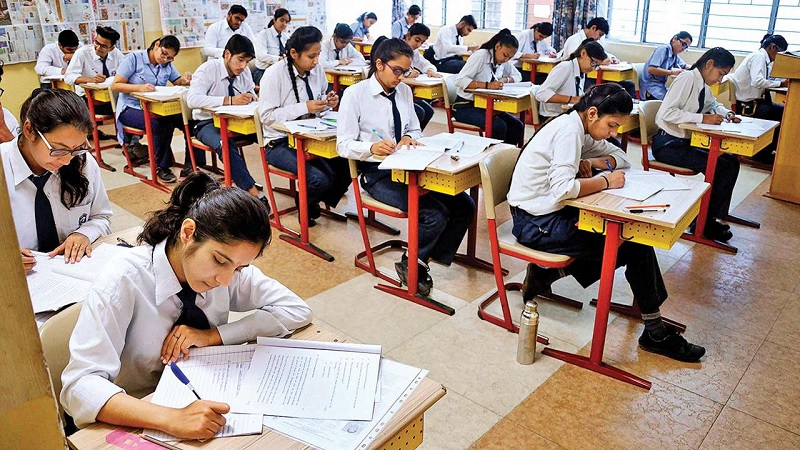
The National Council of Educational Research and Training (NCERT) has deleted some content related to caste, religious discrimination, references to Jawaharlal Nehru, Mughal emperors and text dealing with Muslim stereotypes in its latest review of school textbooks, reported The Telegraph.
On its website, the NCERT said the Covid-19 pandemic had made it imperative to reduce the content load on students. As such, it resolved to remove content which “overlapped with that included in textbooks for other subjects or lower or higher classes, and content that it deemed irrelevant in today’s context.”
As per the report, NCERT termed the exercise a “rationalisation of textbook content” by an unknown group of experts. On the recommendation of this group, a paragraph from the Social and Political Life-I textbook for Class 6 was removed. The paragraph read, “A common stereotype about some Muslims is that they are not interested in educating girls and therefore do not send girls to school. However, studies have now shown that poverty amongst Muslims is an important reason why Muslim girls do not attend school or drop out from (sic) school after a few years.”
Similarly, the group deleted a paragraph from the “Diversity and Discrimination” chapter in the same book that talked about how cleaners, washers, rag-pickers and barbers are considered dirty or “impure”. The paragraph was about how caste rules kept the discriminated castes from taking on work outside of their caste category.
For example, those assigned with picking up garbage or clearing carcasses as per caste rules were not allowed to enter houses of Brahmins or enter temples. The paragraph also talked about how people are kept from drawing water from common wells and how Dalit children are separated from other children even in schools.
Another casualty in the same book is the chapter “Key elements of a democratic government” that covered popular participation, conflict resolution, equality and justice.
In the Our Pasts-I book for Class 6, the chapter on Emperor Ashoka carried a box on Ashoka’ message, from which a reference to Nehru has been erased. The deleted line said, “Pandit Jawaharlal Nehru, the first Prime Minister of India, wrote: ‘His edicts (instructions) still speak to us in a language we can understand and we can still learn much from them’.”
Further, a few paragraphs on Prophet Mohammed were deleted from the New empire and kingdoms chapter in the same book. One of the deleted sentences read: “Like Christianity, Islam was a religion that laid stress on the equality and unity of all before Allah.”
Meanwhile, the Social and Political Life-II book for Class 7, lost characters such as domestic help Kanta, Dalit writer Omprakash Valmiki, and the Ansari family who experienced discrimination over poverty, caste and religion, respectively. Certain introductory content on the Mughal emperors Babur, Humayun, Akbar, Jahangir, Shah Jahan and Aurangzeb were also dropped from the Our Pasts-II book.
In the Social and Political Life-III book for Class 8, a box was removed from the “Confronting marginalisation” chapter that read, “The term Dalit which means ‘broken’ is used deliberately and actively by groups to highlight the centuries of discrimination they have experienced within the caste system.”
The chapter Weavers, iron smelters and factory owners, on crafts and industries under British rule, has been dropped from the book Our Pasts-III for Class VIII.
“Weavers often belonged to communities that specialised in weaving. Their skills were passed on from one generation to the next. The tanti weavers of Bengal, the julahas or momin weavers of north India, sale and kaikollar and devangs of South India are some of the communities famous for weaving,” a paragraph in the chapter reportedly said.
Academicians and experts such as NCERT’s Textbook Development Committee for Primary Education Chairperson Anita Rampal and National Confederation of Dalit and Adivasi Organisations Chairperson Ashok Bharti, feel that the deletions were made along ideological lines rather than for academic integrity. Speaking to the newspaper, Rampal pointed out that the content was changed without consulting the original advisers and writers.
On the other hand, Bharti accused the NCERT’s “expert committee” of trying to hide historical facts out of guilt. Both demanded that the group members reveal their identity.
Even the All India Peoples’ Science Network (AIPSN) in a press statement voiced concern about the various changes made “without any academic considerations or academic logic”. It argued, “No consultation with the SCERTs and the education departments of the state governments, school teachers, and the wider academic community, having been done before deletions and revisions in the content of social sciences textbooks used at the school level.”
The AIPSN argued that all changes were done in a hasty manner, shortly after academics, teachers and the Peoples’ Science Movements voiced concern about the National Education Policy (NEP), 2020.
Earlier, the Financial Express also reported how the NCERT deleted chapters on climate change and monsoon to reduce the load on students. In fact, the Teachers Against the Climate Crisis (TACC) claimed that around 30 percent of the syllabus was reduced for this academic session.
An entire chapter on greenhouse effect for Class 11, a chapter on weather, climate, and water for Class 7 and information about the monsoon for Class 9 was removed. They argued that while the NCERT is reasonable in trying to reduce workload on children, it cannot remove fundamental issues such as climate change science. They demanded a reinstatement of all these chapters.
On the other hand, former NCERT Director during the Atal Bihari Vajpayee government J.S. Rajput told The Telegraph that social science content in textbooks had for decades reflected ideological bias. He accused Left intellectuals of starting this trend with help from Congress-led governments. He criticised the previous history textbooks of dwelling on Mughals while containing little on the histories of north-eastern states or south India.




